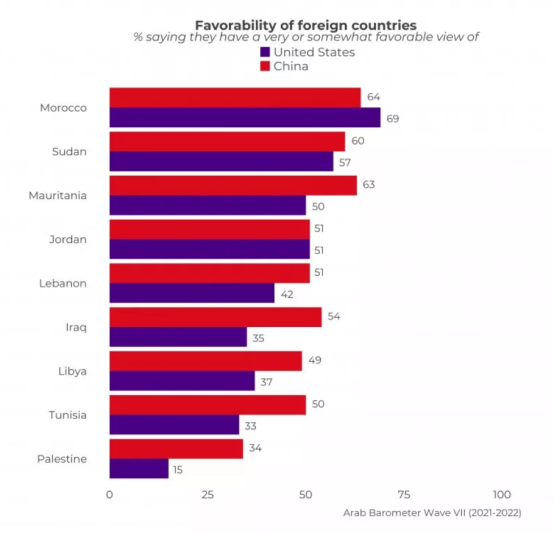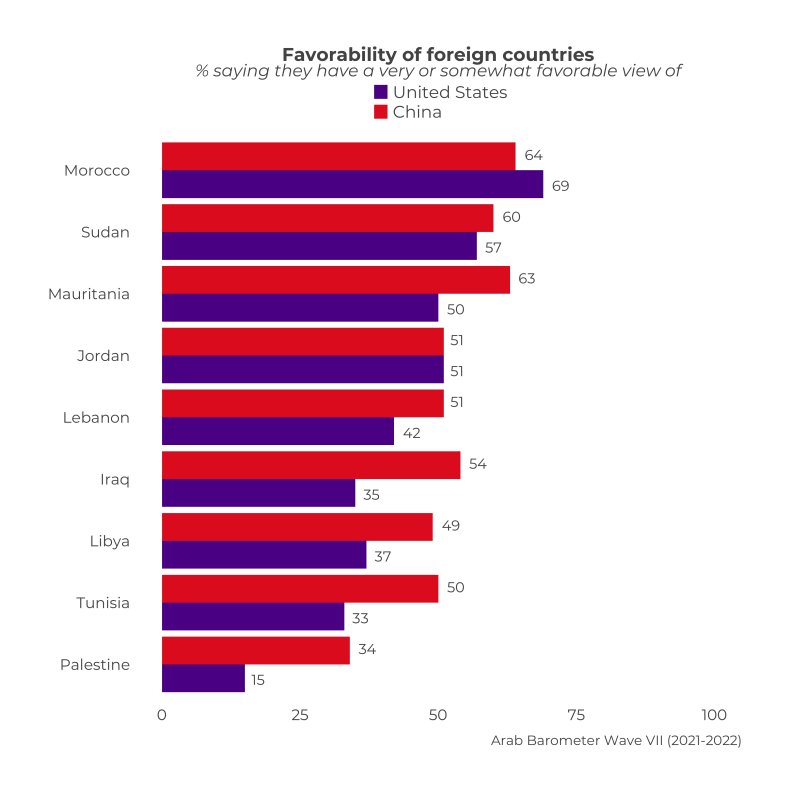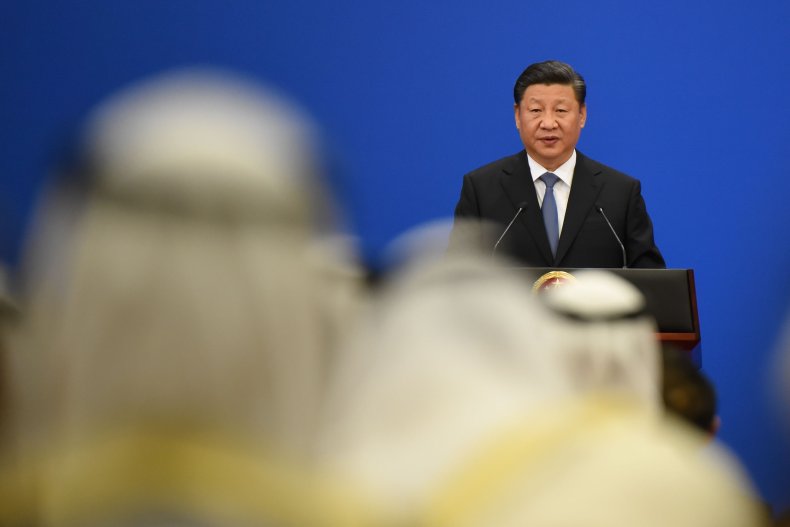風蕭蕭_Frank
以文會友美媒:中國成阿拉伯世界最受歡迎國 在七國中領先於美國
【環球網報道 記者 張曉雅】“獨家報道:盡管麵臨挑戰,中國仍超越美國成為阿拉伯世界最受歡迎的國家”,美國《新聞周刊》當地時間10日以此為題報道稱,其獨家並提前獲得的一項新民意調查結果顯示,中國在至少7個阿拉伯國家民眾中的好感度領先於美國。
China Tops U,S, as favorate Power Among Arabs Despite Challenges

《新聞周刊》獨家報道:盡管麵臨挑戰,中國仍超越美國成為阿拉伯世界最受歡迎的國家
報道說,美國普林斯頓大學無黨派研究網絡“阿拉伯晴雨表”自2006年以來一直在中東和北非進行民意調查,上述民調基於2021年10月至2022年4月期間在伊拉克、約旦、黎巴嫩、利比亞、毛裏塔尼亞、摩洛哥、巴勒斯坦、突尼斯和蘇丹對近2.3萬名受訪者進行調查,每個國家誤差幅度約為2個百分點。
此項調查結果很快就會出現在“阿拉伯晴雨表”的網站上。根據《新聞周刊》提前獲得的調查結果顯示,隻有在對美國和中國的評價都高的摩洛哥,受訪者對美國的好感度(69%)略高於中國(64%),在約旦,受訪者對中美的好感度不相上下(分別為51%左右),在黎巴嫩,受訪者對中國的好感度(51%),比美國(42%)比美國高9個百分點。
提完上述少部分情況,報道繼續說,在大多數其他受訪國家裏,對美國持正麵看法的人都在少數,除了在蘇丹,受訪者對美國的好感度(57%)僅落後中國(60%)3個百分點;在毛裏塔尼亞,中國(63%)則領先美國(50%)13個百分點。
此外,在突尼斯,中國(50%)領先美國(33%)17個百分點;在利比亞,對中國持好感度的受訪者(49%)也比美國(37%)高出12個百分點;對巴勒斯坦受訪者的調查結果顯示,對中美兩國的好感度在所有受訪國的民眾中最低,不過中國(34%)仍遙遙領先於美國(15%)。

《新聞周刊》曝出“阿拉伯晴雨表”調查結果
基於上述數據,報道說,“阿拉伯晴雨表”主任兼聯合首席研究員邁克爾·羅賓斯與《新聞周刊》討論了研究結果。
“中國帶著諸多優勢介入,幾乎沒有地區糾葛纏身,而且明確表示希望在該地區保持政治中立”,羅賓斯說,不僅如此,通過“一帶一路”倡議,中國還增加了整個地區的經濟參與水平。” “考慮到許多其他國家(對該地區)的直接幹預,”他補充說,中國“更中立的政治立場可能會讓該地區許多普通公民感到耳目一新。”
但曝出上述數據的同時,《新聞周刊》的部分說辭卻也有些變調,它聲稱 “北京雄心壯誌的外聯活動在這個被華盛頓留下艱難遺產的地區找到了沃土”,並表示中國想要贏得阿拉伯世界人心的努力也遇到了挑戰,原因是人們對中國所能提供的東西存在一定程度的懷疑。
2022年3月7日,國務委員兼外交部長王毅在兩會記者會上闡述中方在解決中東熱點問題方麵發揮的作用。王毅表示,長期以來,安全與發展一直是困擾中東國家的兩大難題。作為中東國家的戰略夥伴,中國始終奉行“兩個支持”,那就是支持中東國家團結協作解決地區安全問題,支持中東人民獨立自主探索自身發展道路。王毅說,過去一年多來,中方先後提出關於實現中東安全穩定五點倡議、政治解決敘利亞問題四點主張、落實巴以“兩國方案”三點思路,旨在推動對話解決熱點問題、實現地區安全和共同安全。同時,中國同中東各國攜手抗擊疫情,推進疫苗生產、藥物研發合作。加快中國與海灣國家自貿區建設,啟動中國與伊朗全麵合作協議,為促進中東發展提供了積極助力。
王毅還表示,中國在中東發揮的始終是建設性作用,我們從不謀取什麽地緣私利,更無意去填補所謂權力真空。過去數十年,正是因為域外大國競相幹預中東事務,給中東地區和中東人民造成了一次又一次傷害。21世紀的今天,這種局麵不應再繼續下去。應當把維護中東安全與發展的權力徹底交到中東人民手中,支持中東國家以團結謀和平,以自強謀穩定,以合作謀發展,真正實現中東地區的長久和平與繁榮。
Exclusive: China Tops U.S. as Favorite Power Among Arabs Despite Challenges
BY TOM O'CONNOR
Anew poll obtained exclusively in advance by Newsweek reveals that China leads the United States in popularity among the people of at least seven Arab countries, as Beijing's ambitious outreach continues to find fertile ground in a region in which Washington has left behind a difficult legacy.
But challenges have emerged for the Chinese effort to win hearts and minds in the Arab World, as there is some degree of skepticism toward what Beijing has to offer.
Arab Barometer, a nonpartisan research network based at Princeton University that has been conducting high-level polling in the Middle East and North Africa since 2006, conducted the survey based on nearly 23,000 interviews across Iraq, Jordan, Lebanon, Libya, Mauritania, Morocco, the Palestinian territories, Tunisia and Sudan between October 2021 and April 2022, with a margin of error of about 2 points in each country.
The results, soon to be featured on Arab Barometer's website, showed that only in Morocco, which had the highest opinions of both countries, did respondents have a slightly more favorable view of the U.S. (69%) than China (64%), and in Jordan, they were tied (51% each). China achieved the same figure (51%) in Lebanon, but the U.S. (42%) was nine points below.
Those who had positive perceptions of the U.S. were in the minority in most other countries, with the exception of Sudan, where the U.S. (57%) was only three points behind China (60%), and in Mauritania, where the U.S. scored exactly half (50%), while China had a 13-point lead at 63%.
Double-digit leads were also scored by China (50%) against the U.S. (33%) in Tunisia and in Libya, where just under half had a favorable view of China (49%) and even fewer had a favorable view of the U.S. (37%).
Palestinians had the lowest opinions of both countries, though China at 34% achieved its largest lead in all countries against the U.S., which came in at just 15%.

Michael Robbins, director and co-principal investigator at Arab Barometer, discussed the findings of the study with Newsweek.
"China has recently reemerged as a power in the MENA[Middle East and North Africa] region," Robbins said. "China stepped in with a number of advantages, with few regional entanglements and a stated desire to remain apolitical in the region. Through its Belt and Road Initiative (BRI), it has increased levels of economic engagement across the region."
"Given the direct meddling of many other powers," he added, "its more neutral political stance may have appeared refreshing to many ordinary citizens across the region."
Chinese officials have frequently criticized U.S. interventions across the Middle East and Afghanistan, and have taken a far more neutral stance on geopolitical issues in Beijing's extensive business dealings with Iranian, Israeli, Palestinian and Saudi firms, among others.
With the exception of Israel, Jordan and the Palestinian territories, every Middle Eastern and North African country, including the other seven surveyed by Arab Barometer, has signed on to the BRI.
On Friday, Chinese Foreign Ministry spokesperson Hua Chunying accused the U.S. and its allies of having "made up various pretexts such as so-called possession of weapons of mass destruction to picture other countries as threats — and sometimes even without any valid reason— to blatantly launch military strikes and even unleash wars on sovereign countries."
In her comments, which came in response to U.S. accusations regarding People's Liberation Army drills surrounding the disputed island of Taiwan, she specifically called out "humanitarian tragedies" in countries such as Iraq, Libya, Syria and Afghanistan, the first target of the U.S.-led "War on Terror" that has spanned the Middle East and its peripheries in Asia and Africa for more than two decades.
"How many innocent civilians have been wounded and killed?" Hua asked reporters rhetorically. "How many families have been torn apart and lost? Have the U.S. and other NATO countries involved done any soul-searching on these tragedies? Have they felt even a tinge of guilt for the serious ramifications and catastrophes they caused? Have they ever made an apology to the victims in those countries? And have they ever given them any compensation?"
During the next press briefing held Monday, her colleague, Wang Wenbin, lodged a similar accusation.
"For quite some time, in the name of democracy and human rights, the U.S. has wantonly interfered in the internal affairs of developing countries and launched military interventions and aggression against them," Wang said. "That poses the biggest threat to regional and international security."
Though these arguments may resound for many in the Arab World, Robbins pointed out that opinions of China have declined in recent years, and he attributed this to a shift in how Chinese economic overtures have come to be viewed.
"China is not a truly neutral party," Robbins said. "Its terms of economic engagement are ones that tend to heavily favor Beijing over local populations as many, including those living in Sri Lanka and Pakistan among others, have come to realize recently. It appears that those in MENA are starting to come to a similar conclusion — Chinese economic engagement is not all it is cracked up to be."
Other results from the latest Arab Barometer polling showed that those in all nine countries were more likely to view China as providing the lowest-quality and cheapest projects, as opposed to Germany, Turkey, the United Kingdom, the U.S. or "other" countries.
When it came to highest-quality construction, Germany won out in all nations except Mauritania, where the U.S. was the first choice. Across all nations, China was seen as the country that built projects at the lowest cost, with the U.S. and Germany at the other end of the spectrum with the most expensive. The U.S. was also chosen as the favorite to pay the best salary among respondents in the majority of countries.
Desires to build stronger economic relations with Beijing and Washington were mixed. More respondents in Tunisia, Iraq, Jordan, Libya and the Palestinian territories expressed enthusiasm for tightening economic ties with China, while more in Sudan, Morocco and Lebanon sought to strengthen economic cooperation with the U.S., all with single-digit differences except in Sudan, in which 10% more backed better economic relations with the U.S. than with China.
As for whether either power was viewed as a "critical economic threat," however, respondents in all countries were more likely to point the finger at the U.S. than China.

The study might not reflect the full scope of China's influence in the Arab World, as much of Beijing's regional investments has been geared toward wealthier nations, such as those located in the Arabian Peninsula.
Robbins said that these nations have a far stronger say when it came to the conditions of striking deals with China.
"There is a major difference between Chinese engagement with the Gulf countries and the rest of the region," Robbins said. "The Gulf countries are not approaching from the same position of relative weakness. All are wealthy countries that could potentially benefit from Chinese investment and economic engagement, but are not dependent upon it as a development strategy. Losing Chinese investment may hurt them to a degree, but they have other options given their status as high-income countries."
This may mitigate concerns over dealing with China in countries such as Saudi Arabia and the United Arab Emirates, or even Egypt, located on the bridge of North Africa, the Levant and the Arabian Peninsula. China has expanded its dealings with these countries in recent years.
Robbins argues that by comparison "most other countries in the region are at a far weaker position vis-a-vis China," saying that "China can more easily dictate terms of engagement, which often leads to deals that are more in China's interest than those of the country itself."
Also potentially affecting regional perceptions were shifts within the U.S. itself.
Robbins said that President Joe Biden, while his popularity was "moderate" in the region, was still "far more widely favored than former President Trump in the countries that we have surveyed."
During his Middle East trip that brought him to Israel, the West Bank and Saudi Arabia last month, Biden proclaimed that the U.S. "will not walk away and leave a vacuum to be filled by China, Russia or Iran."
At the same time, he has shared his predecessor's stated aim to end "forever wars" in the region. And Robbins said the drawdown of U.S. military involvement may be having a positive impact on perceptions of Washington.
"We do have some evidence that there would likely be support for a decreased role for the U.S. in the region," Robbins said. "When we asked about views of the U.S. military withdrawal from Afghanistan, a majority in all countries surveyed were in favor, including 80% in Palestine and Jordan."
"These results suggest that MENA publics favor a decreased security role for the U.S.," he added.




